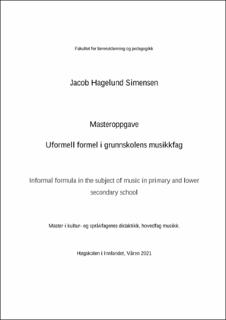| dc.contributor.author | Simensen, Jacob Hagelund | |
| dc.date.accessioned | 2021-12-07T13:50:00Z | |
| dc.date.available | 2021-12-07T13:50:00Z | |
| dc.date.issued | 2021 | |
| dc.identifier.uri | https://hdl.handle.net/11250/2833183 | |
| dc.description | Mastergradsoppgave i kultur- og språkfagenes didaktikk, Høgskolen i Innlandet, 2021. | en_US |
| dc.description.abstract | Norsk:
De siste tiårene har man sett at uformelle læringsstrategier får større plass i det musikkfaglige både i skolen og i musikkpedagogisk forskning. Både for belyse tematikken rundt uformelle læringsstrategier ytterligere, og for å utfordre mitt eget syn på saken, valgte jeg i denne oppgaven å undersøke i hvilken grad og på hvilke måter musikklærere i grunnskolen implementerer uformelle læringsstrategier, og igjen hvilke følger de ser det har for både lærer og elev. Det teoretiske utspringet for undersøkelsen er i hovedsak Green (2005, 2008) og Folkestad (2006) som fra hvert sitt perspektiv danner grunnlaget for min forståelse av begrepet uformelle læringsstrategier. Ved innspill fra blant andre Dyndahl (2019) og Rodriguez (2009) problematiseres også dette perspektivet noe. Videre trekker trekkes også frem komplimenterende teori blant annet i form av et teknologisk perspektiv via Albert (2015) og Partti & Karlsen (2010), en tidligere undersøkelse med liknende tematikk via Sætre, Ophus og Neby (2016), og et perspektiv om elevforutsetninger slik det fremstår i Hanken & Johansen (2014). I min undersøkelse gikk jeg for en kvalitativ tilnærming og intervjuet fem musikklærere i grunnskolen. For å sikre en rik og nyansert diskusjon av oppgavens tematikk, valgte jeg å gå inn i dypere samtaler med et lite utvalg informanter, fremfor en mer kvantitativ undersøkelse. I samtale med informantene søkte jeg blant annet å finne ut hva slags innhold og metoder som fikk hovedprioritet i deres undervisning og hvem som styrte valgene som ble gjort i undervisningen. Det er i ut ifra disse samtalene, at jeg kom frem til at uformelle læringsstrategier er høyst tilstedeværende blant musikklærerne, men ikke nødvendigvis aktivt implementert med målrettet viten. Det er snarere som en følge av en overordnet filosofi blant informantene som i all essens sier at «musikk er et gjørefag» og at elevene selv burde velge repertoar så langt det er mulig for å sikre deres motivasjon og interesse i faget. Det kommer også frem i resultatene at formell kompetanse og bakgrunn hos lærer ikke er ensbetydende med formelt preget undervisning. Undersøkelsen viser at ofte så er enkeltlærerens deltagelse i et fagteam en mer pregende faktor, enn egen bakgrunn alene. Dette trumfes likevel av det at musikkfaget synes å få en særstilling hos musikklærerne der den tidligere nevnte læringsfilosofien er styrende, dette mer eller mindre uavhengig av lærers bakgrunn og læringsstil i andre fag. | en_US |
| dc.description.abstract | English:
In the recent decades, informal learning strategies has taken a greater place in the music subject both in school and in music pedagogical research. Both to shed further light on the topic of informal learning strategies, and to challenge my own view of the matter, I chose in this thesis to investigate the extent and ways in which music teachers in primary school implement informal learning strategies, and again what consequences they see it has for both teacher and student. The theoretical origins of the study are mainly based on Green (2005, 2008) and Folkestad (2006), which from their respective perspectives form the basis for my understanding of the concept of informal learning strategies. With input from, among others, Dyndahl (2019) and Rodriguez (2009), this perspective is also somewhat problematized. Furthermore, complimenting theory is also highlighted in the form of a technological perspective via Albert (2015) and Partti & Karlsen (2010), a previous study with similar themes via Sætre, Ophus and Neby (2016), and a perspective on student prerequisites such as it appears in Hanken & Johansen (2014). In my survey, I went for a qualitative approach and interviewed five music teachers in primary and lower secondary school. To ensure a rich and nuanced discussion of the topic of the thesis, I chose to enter into deeper conversations with a small sample of informants, rather than a more quantitative study approach. In conversation with the informants, I sought, among other things, to find out what kind of content and methods were given main priority in their teaching and who controlled the choices that were made in the teaching. It is from these conversations, which I concluded that informal learning strategies are highly present among music teachers, but not necessarily actively implemented with targeted knowledge. It is rather as a result of an overarching philosophy among the informants as in all essence says that "music is a do-subject" and that the students themselves should choose the repertoire as much as possible to ensure their motivation and interest in the subject. It also appears in the results that formal competence and background of the teacher is not synonymous with formal teaching. The survey shows that often, the individual teacher's participation in a subject team is a more influential factor, than background alone. This is nevertheless trumped by the fact that the music subject seems to have a special position among music teachers where the previously mentioned learning philosophy is governing, this more or less independent of the teacher's background and learning style in other subjects. | en_US |
| dc.language.iso | nob | en_US |
| dc.subject | MIKS | en_US |
| dc.title | Uformell formel i grunnskolens musikkfag | en_US |
| dc.title.alternative | Informal formula in the subject of music in primary and lower secondary school | en_US |
| dc.type | Master thesis | en_US |
| dc.source.pagenumber | 85 | en_US |
